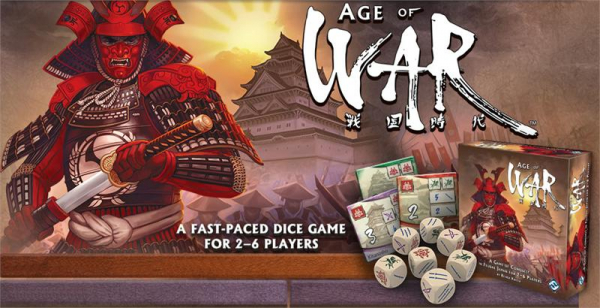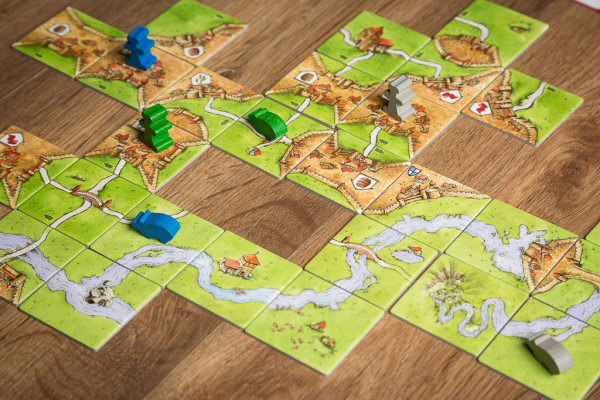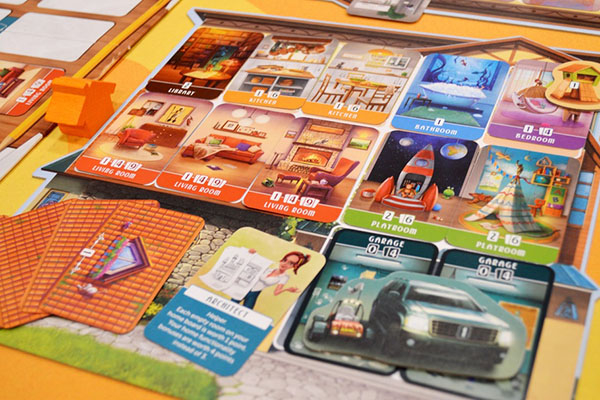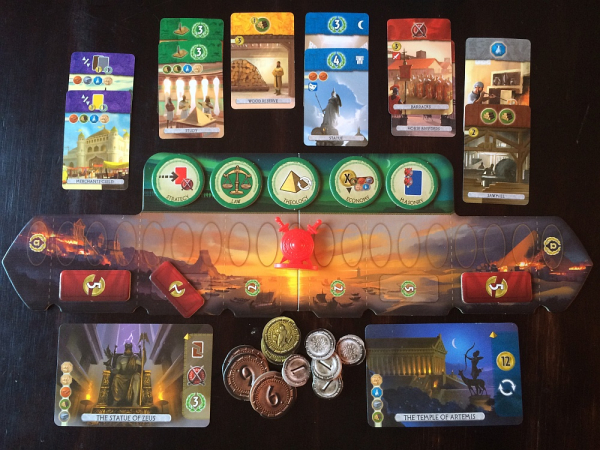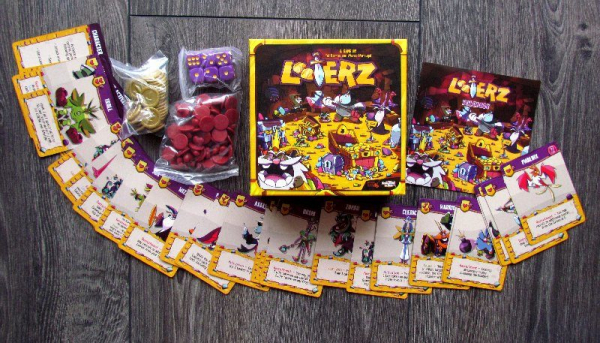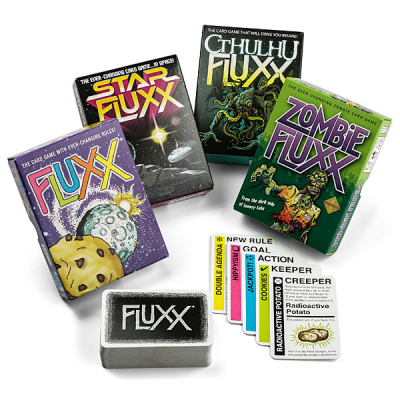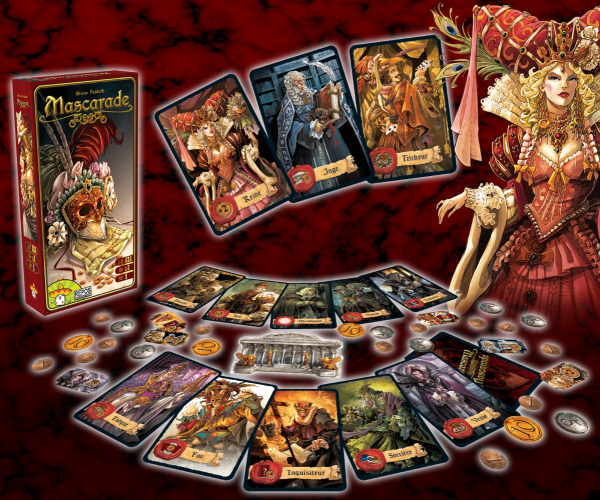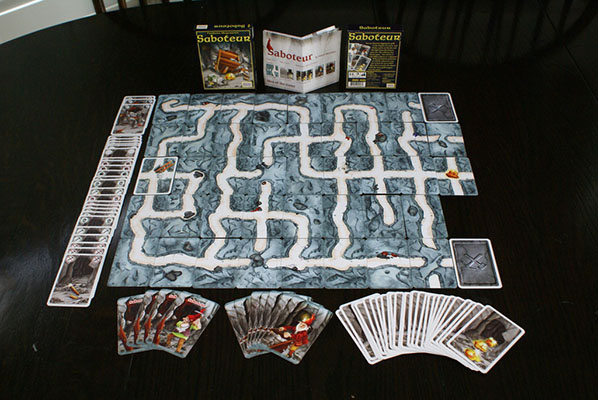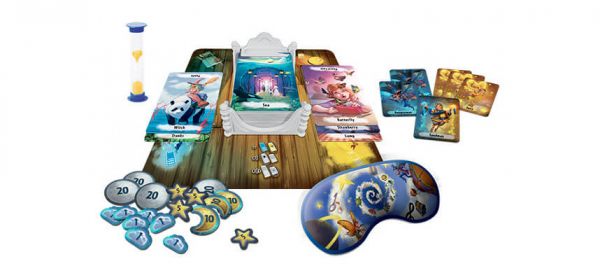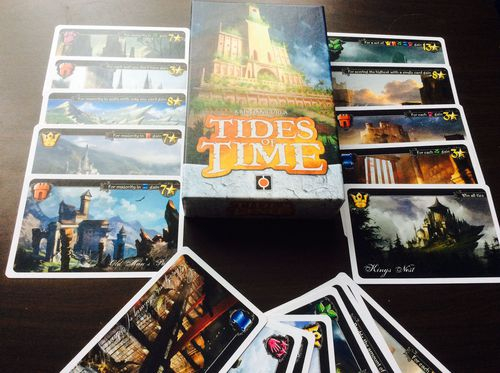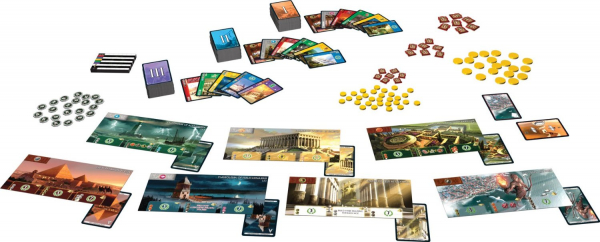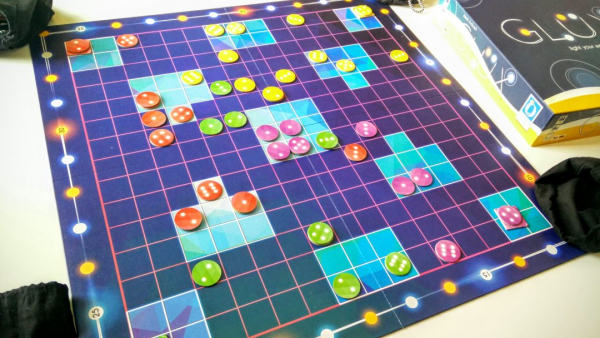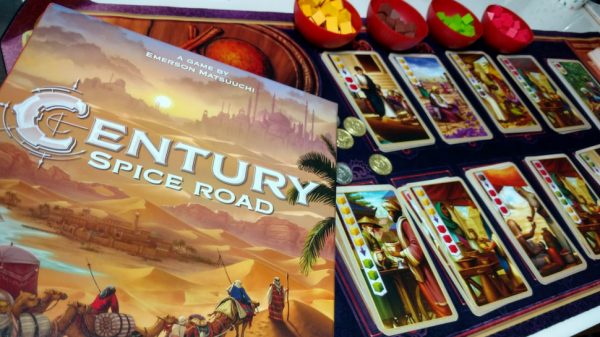Настолни игри за начинаещи Или как най-добре да се хвърлим в Хобито


If board games grabbed your interest at some important stage of your life, then at a certain point you were undoubtedly asking questions like "What kind of a game should I get Jimmy for his birthday?", "What should I buy with my significant other for Christmas?" or, in some cases, "What can we play with the group because we’re sick and tired of Catan?". The latter is, in fact, the main reason for the staff of the column to come together and create this article - there are so many wonderful alternatives to this game that we want to share them with you as thoroughly as possible.
In this article we have tried to highlight the games we find a suitable introduction to the hobby and for convenience we have divided them into formal categories so you can find the appropriate one for you. And for Jimmy too. We explicitly point out that we do not claim this list as exhaustive; rather it presents the tastes of the staff with regard to board games and which among them are the best for a beginner in the hobby. For example, you will not see Catan or Dixit because, despite being very popular titles... we are allergic to them.
And so without further ado…
Dice for you, dice for me...
Do you know the sense of hope and expectation radiating from these small plastic cubes? Dice are one of the most iconic symbols of board games and the titles predominantly based on dice are extremely popular, mostly because they are fast, easy to learn and rarely require much strategic thinking. This makes them a great choice for a light game, not just for beginners, but also for a chill session in between heavier titles. Here are our favorite dice games.
Age of War
If you have at least an inkling of how the very popular game of Yahtzee is played, you pretty much know the basic idea behind Age of War. Just imagine Yahtzee on steroids and situated in feudal Japan. The fairly compact box contains 14 castle cards (separated into six clans), a rules leaflet, and seven special six-sided dice. At the start of the game, the 14 cards are placed in the middle of the table and the first player rolls the seven dice. The goal is to complete the combination of required symbols on a card in order to conquer the respective castle. The symbols are in rows and only one row is filled within a single dice roll or one die is removed if no row condition can be fulfilled. Basically, that's it. A quick and easy game for all ages. More in our detailed review.
BANG! The Dice Game
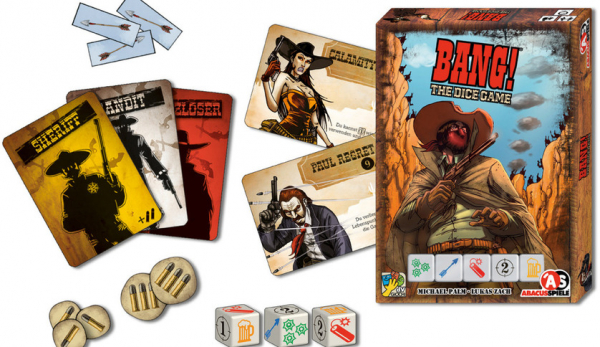
You can not go wrong with BANG! The Dice Game, a delightful marriage of casual dice rolling and hidden identity games, topped off with a great pinch of western flavor. Designers Michael Palm and Lukas Zach have done an incredible job with the gameplay so that it manages to offer enough planning and decision-making, without hindering and slowing the game down, while leaving ample room for those memorable moments when an extraordinary dice roll plunges half the table into sorrow or causes an entire team to erupt in wild joy. BANG! is easy to learn, plays fast (and furious), allows for more people than usual to join in the shoot-out and the character cards nicely diversify every game. Also, The Old Saloon is a great example of how to make a meaningful expansion and breathes a lot of new life into the base game’s living and kicking body.
King of Tokyo
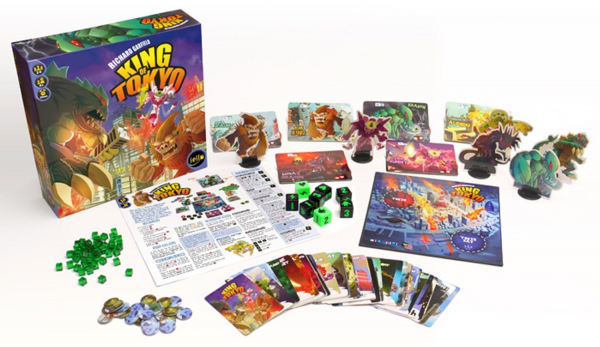
One of the most popular tabletop entertainments, made by the legendary Richard Garfield, King of Tokyo won our hearts with its approachability and addictive gameplay. While it's basically still a dice game, it offers a lot of player choices and options to cunningly steal away the victory. The theme is also fun - the players take on the role of huge, cartoonishly depicted monsters who bash each other over control of the Japanese megapolis. King of Tokyo, like the majority of popular games, boasts several good sequels and spin-offs (King of New York) for the lovers of more engaging competitions. You can find our full review here.
Celestia
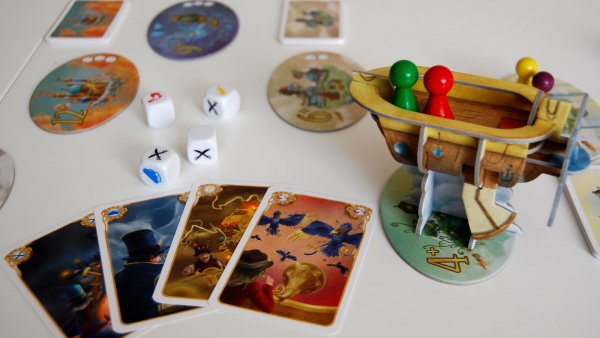
Celestia is a great combination of fairy tale theme, lightheartedness and fun. Players take turns to be captains of an airship traveling between worlds. Successful advancement depends on what dice the current captain rolls and if they have the matching cards in their hand. There is also a slight gambling element because players are constantly having to decide what the chances are for their captain to have the required cards to lead them forward or is it better for them to leave the ship in time for a smaller but guaranteed profit. Like every dice game, this one is not very strategic, but it's beautiful, fast and easy to explain. Our detailed review can be read here.
Camel Up
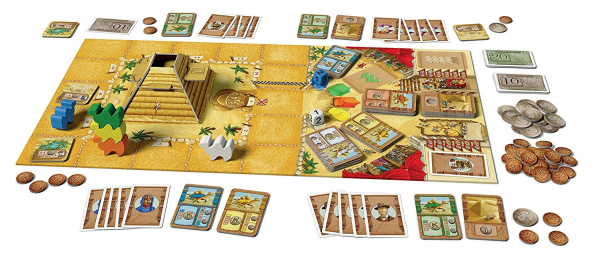
In Camel Up you play the role of rich gamblers who bet on a race between five camels (presented in different colors). Usually the bets are for the current leader, but also for the decisive first and last animals at the finish line, along with how many camels will step on a specific spot. The camels move once per round and in random order, depending on the sequence in which their movement dice are drawn. When two of the animals land on the same tile, they are stacked one on top of each other and the one that is higher is ahead of the other. Thus their order is always precisely defined. And here comes the most original element in the game - when a camel moves, it also moves all the camels on its back with it. This allows for amazing comebacks at almost every point in the race and even the last camel can get the lead within one round! Everything is possible and you can weigh probabilities or simply trust your luck. Camel Up is a fast-paced game, and the camels hopping over one another make for constant unexpected and fun twists. It’s also possible to play more and more consecutive races, for a better immersion in the role of a rich spendthrift Sheikh with a camel obsession.
Dice are for children! I’m an adult and have read A Game of Thrones!
However strong the thrill of leaving your faith in the hands of Chance is, there are people who prefer to fight their opponents through strategic planning and carefully considered moves. Well, the games in the following list are far from being the strategic titans that hardened gamers crave, but they combine easy rules with tactical thinking. A bonus is that you can play them equally well with both your faithful fellows and your treacherous grandmother after a family lunch, for example.
Carcassonne
Sooner or later, everyone is confronted with Carcassonne. At least if there is still some light in their soul, at least. But waxing poetic aside, there is no doubt that this is one of the most popular board games in Bulgaria, partly because of its steady release in all forms and expansions by Phantasmagoria years ago, partly due to its fading yet still spectacular popularity in western lands. So, in Carcassonne, you have the task of laying the tiles of the largest town, the longest road, the most beautiful meadow and the most branched river. Or at least to do it better than your friends. Cities (the game is named after the epically tangled French city of the same name) are the most interesting to build and thus are among the most important elements in scoring.
The rules are insanely simple, distraction and inattention in the strategic development of the game leads to unpleasant surprises down the line and Carcassonne's countless expansions bring extraordinarily well-integrated (well, the majority of them) new mehacnics and "clothes" for the setting - dragons, pigs, princesses, mayoralties, marketplaces, and whatnot. I first became acquainted with the game during some leisurely time at the seaside, when Eraclea still existed and I obsessed over it for a good half an year which flew by as I was explaining, in not too sober a state, the rules for meadows for about two hours. In the end it remains one of my favourite games, even though modern titles offer much more interesting experiences and hardcore gamers in boardgame clubs sneer at it with disdain. Don’t pay attention to those naysayers, there is no better introduction to board gaming!
Dream Home
Dream Home is basically a house-building simulator. It may sound boring, but Rebel.pl’s creation has been one of the most enjoyable family games I've ever encountered and it works great with just two people (which is rare), as well as with three and four. The production value is awesome – high quality components, wonderful illustrations and easily explainable rules. In the span of 12 rounds you collect cards with rooms and resources and try to build your dream home. Finally, you count the points and laugh as your opponents shed tears of woe. You can read the full review here. Thanks to Palladium Games, you can also find the game localized in Bulgarian.
Love Letter/Lost Legacy
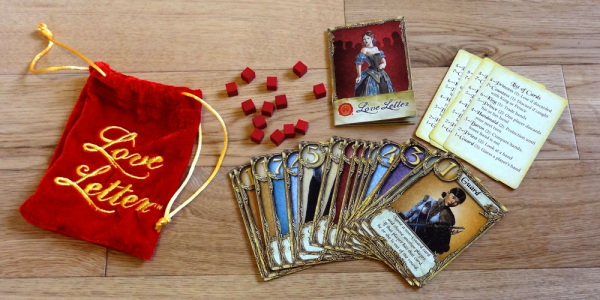
Can meagre 16 cards offer a quality game experience? The designer of Love Letter and its spin-off Lost Legacy, Seiji Kanai, will give you a firm affirmative nod.
The rules of the LL line of games are impossibly easy - you hold a card, on your turn draw a second and decide which one to play and which one to keep. Your goal in the different implementations varies slightly, but in any case it is a game that does not last for more than five minutes.
It’s a compact and elegant title that comes in multiple flavours and reskins (Love Letter: Batman, Lovecraft Letter, Love Letter: Star Wars) and is modular - that is, you can mix different decks and make the game bigger, a little more complicated and fit for more players. The next time you wonder what game you can throw in your back pocket and play in the back seat on a road trip, you have your answer.
7 Wonders: Duel
Is there such a thing as a good 7 Wonders game for just two players? The answer is yes, if we’re talking about 7 Wonders: Duel. Instead of trying to fix the broken rules of the original 7 Wonders, the designers just made a new game. Everyone starts with 4 wonders, and in a single game no more than 7 can be built, so one of the two players will have to settle for an incomplete set. There are three ways to victory– through science, through war and through points. Whichever route you choose, you will have to give your gray matter a good exercise because only a portion of the cards you play with are visible. And so begins a great deal of wondering (pun intended) when the best time is to take a card, whether opening a new one won’t give your opponent the advantage and so on. The replayability factor is huge, and with the Pantheon expansion, things become as epic as the eponymous Seven Wonders. If you are intrigued - click here for more.
Gloom
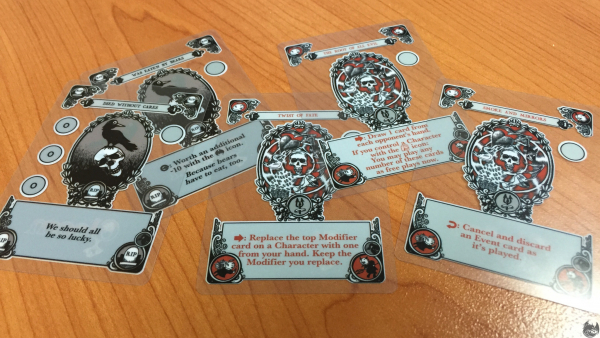
This is the ideal game for people with a darker sense of humor. Everyone has a family at their disposal whose lives they must ruin. The winner is the player who has managed to depress his family members the most, hence - who has accumulated the most negativity. In general, your goal is to rain down as many woes on your characters, while not neglecting to brighten up the day of your opponents’ families in order to reduce their accumulated negativity with some pleasant events. There is also a very cool blending of card mechanics and visual design – the cards are transparent, with only the positive or negative points visible, so you can stack them on top of each other and only count the visible stats and attributes.
Timeline
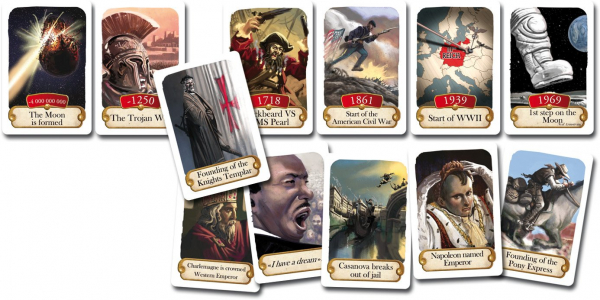
It's hard to even call Timeline a series of games. It is rather a quiz in which contestants try to play their hand of historical events, important discoveries, inventions and what not, in relation to their current year. It is probably easy to know that the European Union was created after the Battle of Thermopylae, but the assessment of whether to put the first vacuum cleaner before or after the First Balkan War -- not so much.
So, in addition to mapping cards in the correct "time line" with the help of your general knowledge, informed guesses or pure luck, Timeline also offers a (very) light tactical element, which is to decide when to put down a card and announce its year.
The game comes in many flavours and colours besides the already mentioned Historical Events, Discoveries and Inventions - you can also find Music & Cinema or country-specific cards (History of America, Russia, UK), etc. As a bonus, at the Sofia Board Game Weekend hosted in March, we were presented with an extremely good-looking version of Timeline, created by Bulgarian students with a focus on Bulgarian history. We cross our fingers that it will soon be widely available!
Cooperation is the road to success! Especially when you‘re being chased by zombies and someone is slower...
It’s an open secret that the most direct route to a family scandal or a broken friendship (after the A Game of Thrones board game, of course) are exactly the co-operative games. Seemingy suitable for beginners and less confident people due to the shared responsibility, these special representatives of the hobby enjoy a great deal of popularity. Here's the titles we think you should definitely play.
Fuse
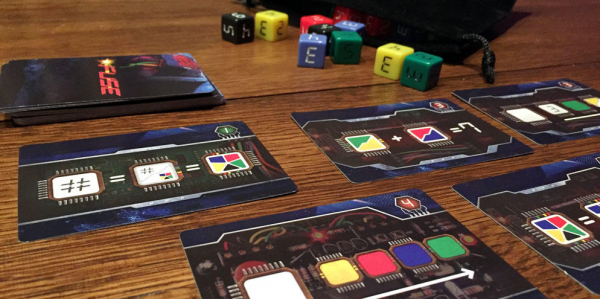
Unlike most kids, when I was young I dreamed of becoming a bomb disposal unit member. When the time came for conscription and the military draft committee, they asked me if I had any preference, so without thinking I replied “Yes, bomb disposal.” As it turned out, almost five diopters of myopia and a slight tic in the right hand from exhaustion proved to be an insurmountable obstacle to my dream career (or even basic military service). What can you do, the Bulgarian army lost a great talent, but the world got ShadowDance.
18 years later, I finally truly got the chance to experience the adrenaline rush induced by the inexorably ticking timer from the comfort of my living room table. Fuse is a dice puzzle game that lasts exactly 10 minutes, whether you play it solo or with another 4 friends. You are onboard a spaceship attacked by enemies that have planted a huge amount of explosive devices. Your goal is to disarm the bombs (in the form of cards) by using the colored dice to complete the corresponding color/value combinations. It does not sound particularly complicated, is it? Now add to this the ticking timer, the fact that you can take exactly one die of the available pool in one turn, the varying complexity of the bombs and the penalties when there are unused dice left and you have guaranteed high adrenaline levels and heart attacks. For full immersion, I recommend using the official Renegade Games app, where the board computer acts as the timer and adds sarcastic commentary along with some background sounds. Fuse is a strong dose of entertainment distilled in just 10 minutes. The first run through you will probably fail, as well as the second, and even the third, but I guarantee that you will be coming back again and again...
Hanabi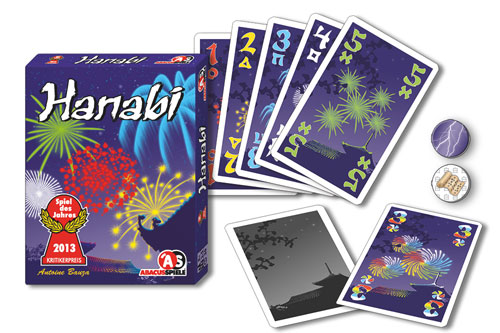
Hanabi is a co-operative game in which players work together in order to produce the most beautiful fireworks display. The fireworks themselves are represented by cards in five colours and five different values that need to be played in an increasing order. The curious thing here is that you hold your cards with the back to yourself and the face towards the others, i.e. you can’t see what you are playing. To avoid mistakes, the other players point out all cards in your hand of either one color or one value. However, the number of hints is limited, and they need to be meticulously considered and interpreted.
The rules of Hanabi are simple, it plays fast and it requires mutual understanding and reasoning with your partners. The process of refining your tactics between multiple replays is one of the most enjoyable and satisfying experiences I've ever received from a game. And even more remarkable is that even after so much time, Hanabi continues to put me in interesting situations and makes me figure them out.
The game is also compact with few components and in a metal box that is great to carry in your backpack and bring everywhere with you.
Between Two Cities
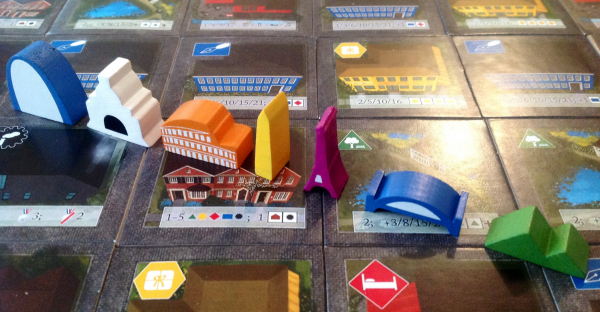
In Between Two Cities you build a city. But the somewhat unusual thing here is that you do not create one, but two. And not alone, but in cooperation with two other players, each interacting with you and someone else. Every turn everyone chooses two tiles, then discusses with their neighbors what tile should be used for which common venture - that to the left or to the right. So it happens that you are "between two cities", hence the name of the game. The tiles themselves are of six types - offices, shopping centers, recreational buildings, factories, houses and parks. Each of them scores points according to their number and connectivity. After seven turns you assemble your creations in pairs. The score is counted and whoever has the strongest “weaker” city (weaker among his own, but stronger than his opponents’) wins, which presupposes balanced construction.
The game is intended for three to seven people. It plays fast, with short, simultaneous turns, therefore playing with more people doesn’t lead to more downtime and in fact the more there are, the better. Usually, you can easily agree on common tactics with your two neighbors, but sometimes there are disagreements about title distribution. This creates a gameplay of combinability, with a pinch of trickery and manipulation. However, the game is light and enjoyable and predisposes to several playthroughs one after another. Our detailed review is here.
Codenames
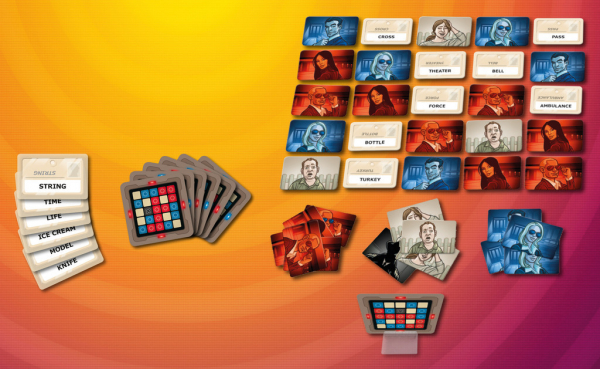
It is no coincidence that Codenames has deservedly occupied the first place in BoardGameGeek’s Party Games list. Vlaada Chvátil, a master in the trade, has created a game which is an absolute hit with beginners 9 cases out of 10 when we’ve shown it to them. It’s also perfect when you want to play something with more people or even when you just want to combine a nice beer with some leisurely play at the table.
The main idea is both simple and brilliant - you put 25 cards on the table, split people into two teams and elect two “spymasters” for each team who have to give hints to their respective teams. They receive a template, visible only to them, which indicates which words each team has to guess and which are neutral. Then, with just one word and a number, they should hint to their team what their words are - for an easy example, if you have to describe Lion, Rabbit and Giraffe, you would naturally suggest "Animal, Three," but when you are left with Melon, Crowbar, and Australia, you will have to really fire up your imagination.
Extremely suitable for an introductory game, wildly addictive, with a translation in Bulgarian (which I recommend for Bulgarian speakers), a two-player spin-off (Codenames Duet), a version with pictures (Codenames: Pictures) and others. Once tried, it will often come into play, I promise. More on it here.
Pandemic
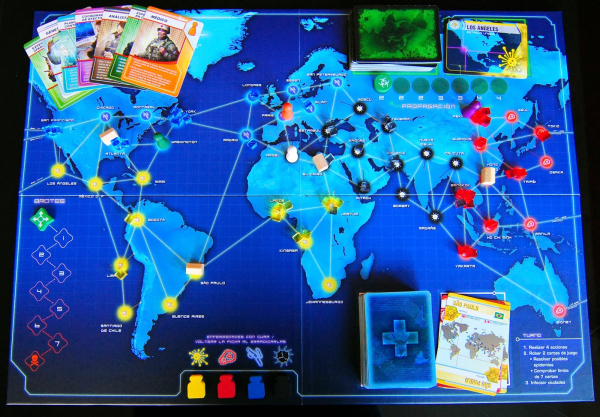
Probably the most famous co-operative board game in the world. In it, players take on the roles of scientists, doctors and other professionals whose purpose is to rid humanity of 4 diseases which are happily infecting the global population with every passing turn. With your forces united, you must fight to find a cure before the plagues wipe out all of our dumb species. The game distinguishes itself with its interesting theme and very intuitive rules. It's very good for beginners because even a single player who knows the rules is enough to help everyone. Although its duration is slightly longer than most of the games listed above, the passage of time isn’t noticeable, as everyone is constantly involved in what’s happening and in discussions with the others, instead of getting bored. Additionally, the difficulty of the game can be adjusted, which gives it even more replayability and flexibility. Pandemic is also available in Bulgarian and is one of the most popular tournament games.
A miscellaneous assortment!
This is probably our favourite category. Here you’ll find all the games that do not obey strictly defined categories and types, making them our absolute favorites. Here are our precious rebels.
Splendor
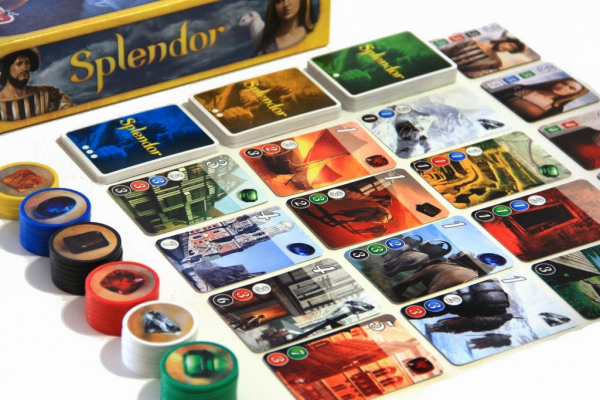
In Splendor, you are jewelers competing for the honor of crafting the best gems and winning nobles’ favor. To do this, you collect chips with which you buy cards. The latter bring you points and a discount on future purchases. The first player who earns 15 points wins.
The complete rules are very simple and are easily explained in 5 minutes. The turns fly by quickly and the game usually ends in less than half an hour. Therefore in your first few playthroughs, the gameplay boils down to collecting chips and carefree purchasing of cards. After a certain amount of replays however, its potential is revealed to more experienced players. Splendor actually offers some quite cerebral gameplay with lots of stalking, obstruction and outdoing between players, perfectly suited for more competitive types. That's why it’s one of the more popular tournament games. If you are interested, you can also read our full review.
Ticket to Ride
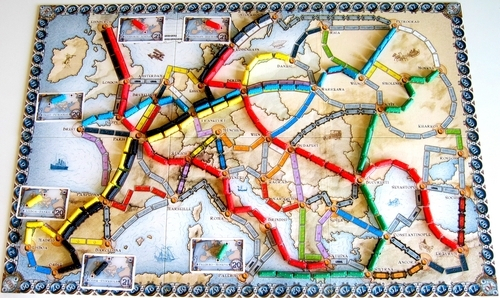
For me, Ticket to Ride is the best title to spark someone’s interest in board games. There are several reasons for this, but I’ll start with the theme - the goal is to build the most successful rail network. Players collect resource cards that they subsequently use to build lines between neighboring cities, which is marked by placing cute plastic wagons. Everyone also has secret routes from ticket cards connecting remote destinations and receives bonus points for completing them. This is the main idea of the game. Players interact with each other almost exclusively in the race for train lines which can be built by only one. This, along with the complete lack of violence and direct confrontation, makes Ticket to Ride very suitable for children and less competitive people.
There are only a few rules, which are explained quickly and after two or three rounds, even beginners can get a feel for the game and plan accordingly. The turns themselves are short, as is the player rotation, which helps to avoid being distracted. I strongly recommend that the points be calculated at the end of the game, which speeds things up and brings a healthy smidgeon of uncertainty who exactly is in the lead into the mix. This allows people to enjoy the lines and routes they build without being discouraged if they are lagging behind.
Despite all this, the game also offers a deeper level gameplay for the more experienced gamers. Carefully selecting which cities to connect, planning turns and back-up routes, blocking the opponents and running in a rat race for resources and train lines all make Ticket to Ride feel always new and intriguing.
The additional maps bring more variety to the game, most of which introduce little novelties into the rules. I personally recommend India, Switzerland and the magnificent team-based Asia map.
Colt Express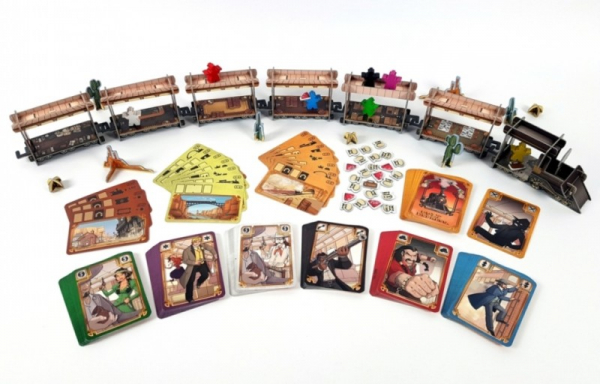
It's no coincidence that Colt Express is the proud winner of a "Game of the Year" award from Spiel des Jahres. In it, the players take on the roles of train robbers. In the span of a few rounds there is a chase within wagons and on the roof, constantly avoiding the sheriff and naturally, ruthlessly taking out the competition. The bandit who has managed to seize the largest amount of money at the end is the winner. The game is easy to explain, plays out smoothly and the action takes place in a pre-assembled train model that contributes to the cool atmosphere and theme of the game. Additionally, it can be played with up to 6 people, which is always a bonus. Very suitable title for beginners in the hobby or for experienced players who are looking for some fast entertainment. More about the game in our detailed review.
Looterz
In Looterz you play cards, roll dice and make your friends’ lives miserable. The most ruthless one wins. The art is cartoonish and very entertaining, the rules and flavor text for characters and abilities are written with quite some humour and some of the cards allow for pretty impressive combos which could lead you to victory in a seemingly lost game. There is quite a lot of luck involved (it is a dice game, after all), but I guarantee that even when you lose you will do it with a smile. More about it here.
Android Mainframe
If you grew up in the 1990s, like me, there is no way you did not play Dots and Boxes That game where you put points on a piece of paper and try to close as many squares as possible. Android Mainframe is more or less the same game, but on steroids and set in the cyberpunk world of the Android: Netrunner universe.
Fantasy Flight know how to produce games and it shows here, too - a constructible black plastic board, plenty of blue plastic “partition” lines and cards with great artwork. Unlike the classic abstract game, here you play the role of hackers and the board is the corporate mainframe you‘re all assaulting. The goal is simple - to control as much territory as possible. Placing lines on the field is done using cards with configurations shown on them, which are of two types – those from the common deck, available to all, and those with special abilities which are specific to each hacker. It is the asymmetric element that really adds a theme to the game and makes it super fun with any number of players (2-4), ensuring fairly good replayability. Of course, there is a certain risk of analysis-paralysis, but this is, of course, typical for most strategic games. I recommend the game with both thumbs up, especially if you’re not afraid of a healthy dose of confrontation.
Flux
One thing that unites all the games on this list is the clear knowledge of the different games’ win condition. Well, with Fluxx the designers apparently decided to turn the win condition from a constant into a variable. The basic rule is that the rules change! You start with a number of cards in your hand and with a set of initial instructions - you draw one, play one and perform instructions. The cards in your hand, however, allow you to change virtually any of the mechanics in the game and add new ones that are in force until someone replaces them. It sounds confusing, but it's fun and pretty quick to get accustomed to. Most win conditions are related to the cards you have in front of you on the table, the so-called keepers, but that is not necessarily in every case.
Of course, such a chaotic change of rules, where you might be denied the victory just one step away before achieving it, has the potential to quickly become quite irritating and prompt you to flip the table over like that ancient meme. This is where Fluxx’s other big strength lies – there’s a generous selection of thematic decks that cover the whole nerd fandom - Cthulhu, Monty Python, Firefly, Star Trek, The Reconquista and Wild West are a small part of the decks you can get (well OK, I came up with the last ones, but they are probably coming!) Like Magic: The Gathering (from a distance and if you’re somewhat tipsy), every deck introduces some mechanics, tied more or less to its theme and at least for a while it will provide you with some good party time fun, especially when high on spirits (hello, Drinking Fluxx) or with a group obsessed with a particular theme.
Me, a traitor? There is no such thing!
When you get more people to play with, hidden identity titles become the logical choice. The ideal time to look beyond the veil of your friendly (and marital) relationships with the others and see just the kind of traitors and backstabbers you break bread with. Games of the type usually include easy rules, unforgivable mistakes, lying through your teeth and vicious witch hunts. We love them!
Werewolf/Mafia
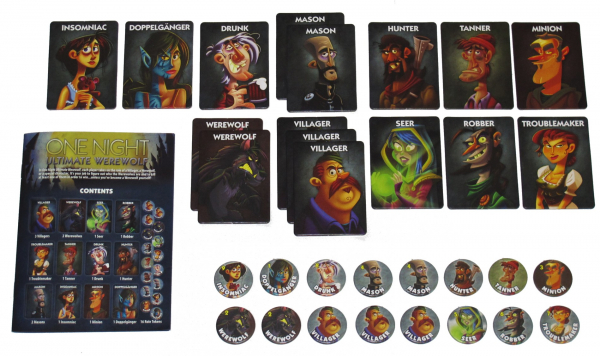
Werewolf and Mafia are more of a family of games from the "social" genre that have undergone dozens of interpretations over the years, rather than unique titles. They are especially suitable for people who prefer games based on communication and not seemingly complicated rules, while also being perfect for large groups as they have no limit to the number of players, at least on paper.
The basic idea is simple - players are given a random identity card and are divided into two general teams, good (peasants or ordinary citizens) and bad (werewolves or mobsters). The good are more, but are generally unaware of the identity of anyone else in the game and the baddies are fewer, but they know which of the neighbors are on their team. A cat-and-mouse game follows, or rather a day/night cycle in which one group tries to reveal the rotten apples and the apples in question are trying to conk the opposition out of the game by all means possible.
In general, the idea is to lie and outsmart the others, conversations and discussion are encouraged, and depending on the people you have got together, they can grow into heated arguments and quarrels.
As I mentioned earlier, the basic foundation has been extensively upgraded and various companies have added dozens of diverse roles, additional teams, and other mechanics and extras to gamify the experience further, so there’s something for everyone.
The Resistance/The Resistance: Avalon
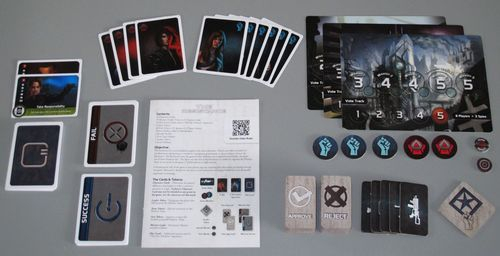
The Resistance family of games has taken the exceptionally popular kernel of the aforementioned Werewolf/Mafia - the division of two teams with secret identities - and has built on top of it in a way that has become a favorite for thousands of players around the world.
Perhaps the most important changes are the lack of elimination of players inherent in most of the Werewolf and Mafia titles, the removal of the moderator and the day/night cycle in which people around the table have to constantly open and close their eyes.
The changes proved to be a success and The Resistance instantly became an emblematic title with several expansions plus a spin-off in Arthurian garb (you can read our full Avalon review here). Expansions add more depth and options for outwitting your opponents, so if you want a strong addition to the "Social Games" category of your collection, The Resistance is a must-have that has proven itself over the years.
Coup
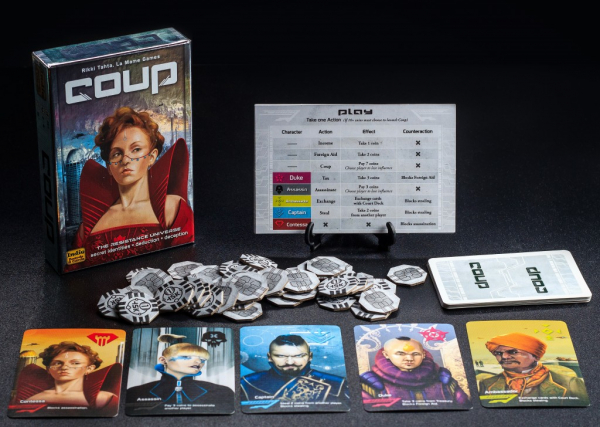
Coup is among my personal favorites when it comes to small, fast and smart games. Yet again, there are hidden identities/roles, but their influence is significantly toned-down and the main mechanic is the good old bluff.
We've written in detail about this jewel here, but if you dislike clicking on links, the game is as follows - each participant gets two role cards and takes an action on their turn. The different roles allow different actions, but as it’s all about bluffing, you can happily claim one thing while holding something else. Be alert though, because at any time someone may challenge your words, and that's what the mastery in Coup is about – to carefully gauge when to bluff and when not to, as well as to keep track of what the others are doing and in turn catch them red-handed. The goal is to eliminate all your opponents and it is achieved by "burning" both of their role cards when they are revealed.
Great design, beautiful realisation, a few good add-ons - what more do you need?
Masquerade
The first thing to notice in this game is the incredibly beautiful card art. Really – it’s absolutely gorgeous. The mechanics, on the other hand, are far less impressive. Everyone has a secret identity with a unique way to accumulate money/points. On their turn, the player can do one of three things - look at their card, swap it with someone else or declare what role they are and use their coin making abilities. Tracking the secret identities is virtually impossible, so chaos ensues very quickly and you’re never quite sure whether you are a king or a beggar. Your victory now depends on how convincing you are and how lucky you are. It is a suitable party game for large groups with no patience for strategic thinking.
Saboteur
In this game all players are dwarves who dig tunnels in search of gold. The conflict stems from the fact that some of them are saboteurs who try to sabotage the efforts of others and seize all the gold for themselves. A great fast and fun game where you have to keep a careful eye on the direction you’re digging in and who you trust. It is also marked by the paranoia and witch-hunting drive characteristic for this kind of games. What often happens is that the good dwarves will quarrel amongst themselves, while the bad ones silently bury them ever further away from the gold. Another plus is the compact size and affordable price. Perfect for a gift, to play with beginners or even just to carry with you for any occasion.
Big, bald and eats ice cream! Oh, you know the boss too?
Also known as charades or word associations, where you have to work with impassioned declarations like: "Of course I meant a potato! Look at its ears and tail, it’s just like a potato!" In other words, these examples of the board games kingdom are a surefire way of finding out how tenuous the strands of logic and cause-effect in your friends’ heads are. The sad truth is among the magazine staff there is a general sense of perplexity as far as these games are concerned. We understand why they’re so popular (to a certain extent), but we avoid them like the plague. That's why we have only three representatives in the category, four if we count the aforementioned Codenames, which could also be placed here.
Mysterium
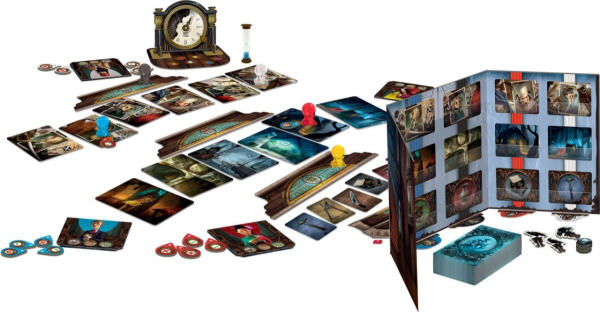
This game can also be considered for the co-operative games category, as the goal of the players is to solve the mystery surrounding a murder in a creepy mansion together. While the art and game components are high quality, the gameplay certainly leaves a lot to be desired. The main problem comes from the fact that the information which should help the players solve the case comes in the form of cards with abstract pictures that can be interpreted in thousands of ways. The huge deck of such cards and their wide variety of themes make the task of the player in the role of the ghost sending these "dreams" often frustrating and nigh impossible. How do you convey that the killer used a hammer if you only have cards with fluffy bunnies, a croissant and one with a chessboard? Sometimes, of course, the game goes well, the cards are all good and all is fun. A matter of luck, I guess. More about Mysterium here.
When I Dream
I can safely call this game "the better Mysterium" for a number of reasons. First, the basis of When I Dream is also abstract-looking cards with pictures. Second - unlike Mysterium, player interaction is much more integral and important. One after the other, players take up the role of dreamers, and their comrades become fairies or nightmares. Since the dreamer is blindfolded, they rely on the hints given by the others to guess the cards that show up at the table. The idea is that the fairies give true suggestions, while the nightmares – false ones. The combination of bluffing, cool drawings and direct simultaneous interaction between everyone works surprisingly well. Points are earned in different ways for each of the roles, but ultimately, it’s important that everyone is directly involved in the game at any moment. It’s a fun party game much better than the more popular Dixit and Mysterium. An extra bonus point was the great ad campaign for the game at the 2017 Essen expo!
Once upon a Time
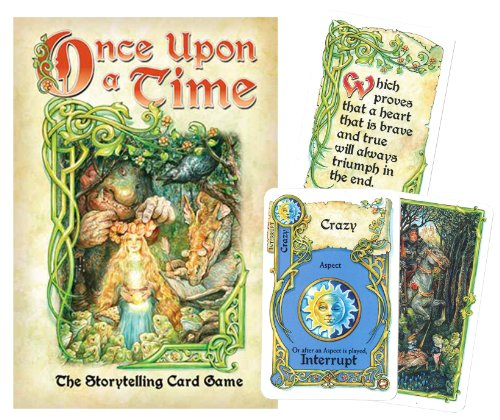
Once upon a Time is not a classic association game, but it is related to fantasy and storytelling. This little piece of art is a wonderful party game for beginners. As the title suggests, it's about telling stories – all drawn in the classic magical style familiar from the books we read in our childhood. Each player has a set of cards that represent events, characters and objects around which a story must be created. If you are not good at storytelling, someone will interrupt you and continue the story in your place. A leisurely party game that can be wonderful with the right people, with a lovely art to boot.
Okay, they call me the King of "Snakes and Ladders". I'm ready to go to the next level!
From personal experience we know that board games quickly lead to addiction and it is quite likely that you will soon feel hunger for even bigger challenges and complicated schemes. This will take you to the world of "games for adults". Here we’ll present a few games with some more sophisticated gameplay, for which we recommend that you have experience with at least one or two of the previously listed titles. We emphasize that these are not serious strategic games and their duration and complexity remain in the area of pleasant entertainment.
Hit Z Road
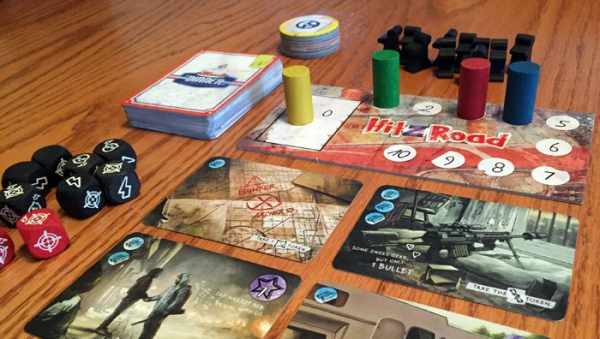
Hit Z Road can safely win any component design award – this is hands down one of the coolest and most thematically well-thought-out zombie games I’ve ever seen, without tons of plastic. The rules are well-described, there is balance between strategy and luck and a very fulfilling solo variant. Surely one of the games we've had the most fun with, including while we were writing this review.
Lords of Waterdeep
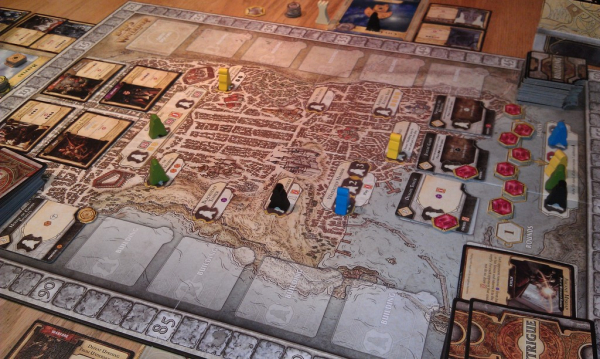
Lords of Waterdeep is a bit more complicated than most of the games on this list, so it's a good entry option in the hobby for people who love more complexity and opportunities for play. It can also be a second offering alongside a lighter game, to show the variety in the hobby.
In this game you run one of the organizations in the intrigue-ridden eponymous city of Waterdeep, situated in the world of Dungeons & Dragons. Your task is to score the most points, which you earn primarily by completing quests. For each of them, you need to bring together an appropriate party of adventurers, each representing one of four types - fighters, rogues, wizards and clerics. On your turn, you place one of your agents on a vacant location in the city while recruiting candidates for glory, taking on quests, drawing and playing intrigue cards and so on.
The rules are not that complicated and after the first agent placement the main mechanics are pretty clear. Nevertheless, Lords of Waterdeep offers a good level of complexity by combining the rewards that the accomplished quests give you, making you fight to occupy the most desirable locations and by introducing intrigues that break up the normal flow of play. If you like this title, I strongly recommend the Scoundrels of Skullport expansion, which adds some more variety, without unnecessary complication. More details about the game can be found here.
Tides of Time
Tides of Time is one of the micro games that have become popular as of late, such as Love Letter and Lost Legacy. There are only 18 cards, 4 tokens, a pencil and a bunch of scoring sheets in the box. However, the game presents you with a surprisingly deep level of gameplay, with options for strategic play where every decision is important. As soon as the first cards are revealed, you get an idea of the opponent's supposed strategy and you face the dilemma whether to sacrifice a card, just to deprive them of another that will give them an edge. Sometimes such sacrifices are repaid in the long run, sometimes it turns out that the move was a bluff and their strategy is quite different. You will be pleasantly surprised by how many possibilities for planning and maneuvering these 18 cards have to offer. The complete review is here.
7 Wonders
When it comes to classic board games, 7 Wonders is among my personal favorites. This is a game where you have the opportunity to create your own city around one of the seven wonders of the ancient world. This happens within 3 eras during which your buildings become more and more developed culturally and architecturally. The main element is the so-called draft mechanic, where players choose one card and pass the others to their neighbour. As for neighbours - everyone has one on both sides and can trade or war with them. The rules of 7 Wonders are not very complex, the game length is quite enjoyable and every play is fairly unique. Additional features are the relatively large number of people who can play at once and the team variant that comes with one of the expansion packs. Overall, it’s a great choice for your first "more serious" game.
Glüx
It's not a secret for anyone who knows me that I adore abstract strategies. In a good chunk of my favourite games, the theme is just tacked on and has absolutely no bearing on the gameplay. Glüx is just such a game - the goal is to place the chips on the map in order to "illuminate" the rooms. The tricky element is that the chips are two-sided (similar to the opposite sides of the six-sided die 1/6, 2/5, 3/4) and their value indicates how many squares away you have to place the next one. E.g. if you have a chip “six” and a chip “three” on the board, the next chip should be placed either six squares away from the six or three squares from the three. Naturally, the idea is to get the chips into the rooms because at the end of the game their value is summed up and the player with the most points wins the room. Besides on empty tiles, you can also place chips on those containing exactly one chip (yours or your opponent's), which adds an additional strategic and confrontational element. The game ends when the players run out of chips or have no legal moves available.
If you like strategy games with elegant and easy to explain rules - Glüx is a great choice. The playing board is two-sided - for 2 players and for 3-4 players, with the starting positions depending on the number of participants. Glüx offers great replayability and is awesome regardless of the number of players. A big seal of approval from me.
Century: Spice Road
One of the first games designated as "Splendor killer". I don’t quite agree – they have their differences and both have a place under the sun, but Century: Spice Road for me is the more “game-y” and deeper of the two. The theme is barely there – you’re a spice merchant and you are trying to fulfill a number of orders. You do it by building an “engine” of cards. The components and art are phenomenal (metal coins, plastic bowls, big tarot cards), the gameplay is almost perfectly balanced. It’s definitely one of the best games of 2017. You can read more details in our review.
Ако настолните игри са грабнали интереса ви в някакъв важен етап от живота ви, то несъмнено в един момент сте били изправени пред въпроси от рода на „Каква игра да взема на Ставри за рождения ден?“, „Какво да си купим с благоверната/благоверния за Коледа?“ или в краен случай „Какво можем да играем с компанията, понеже Катан ни омръзна?“. Последното всъщност е основната причина екипът на рубриката да се стегне и да сътвори тази статия – има толкова много прекрасни алтернативи на въпросната игра, че искаме да ги споделим възможно най-обстойно.
В настоящата статия сме се опитали да отсеем игрите, които намираме за подходящо въведение в хобито, като за улеснение сме ги разделили в условни категории, за да може да откриете най-подходящата за вас. И за Ставри. Предварително подчертаваме, че не претендираме настоящият списък да е абсолютно изчерпателен; по-скоро представя вкусовете на екипа що се касае за настолни игри и кои са най-подходящите от тях за всеки начинаещ в хобито. Например в него няма да срещнете популярните заглавия Catan* или Dixit*, просто защото… сме алергични към тях.
И така…


